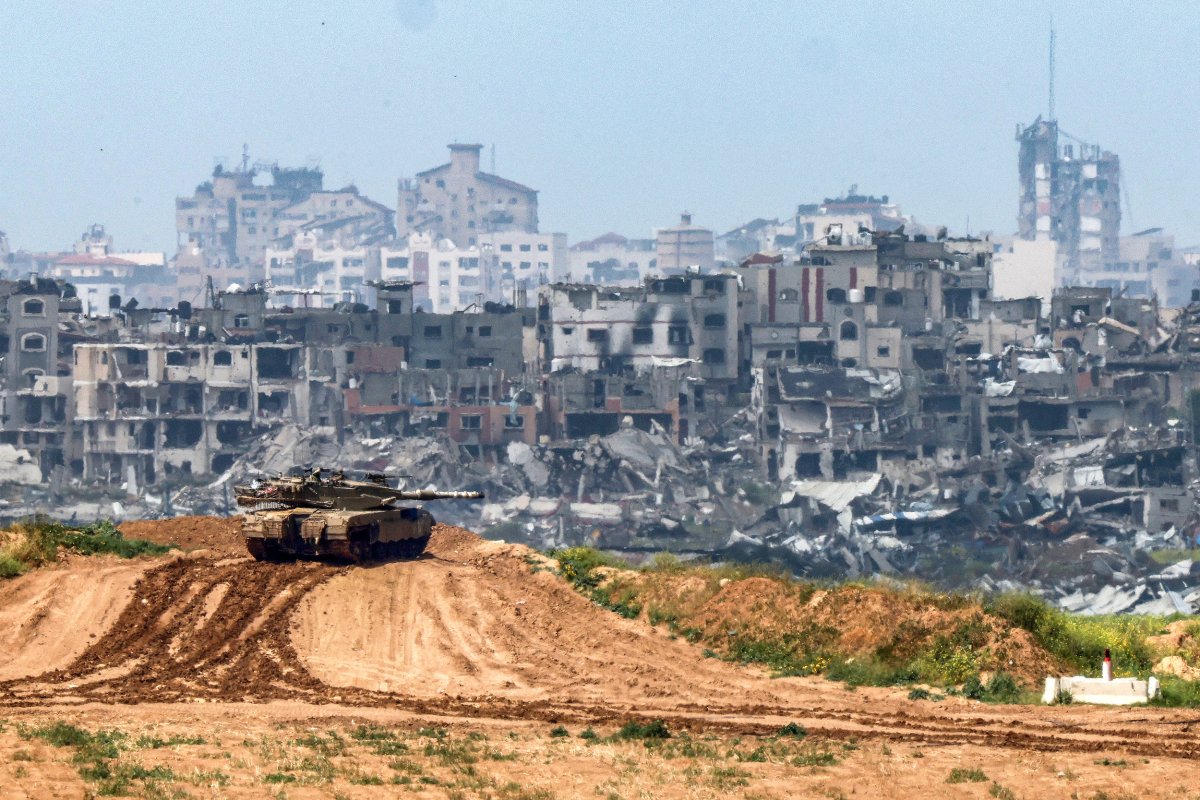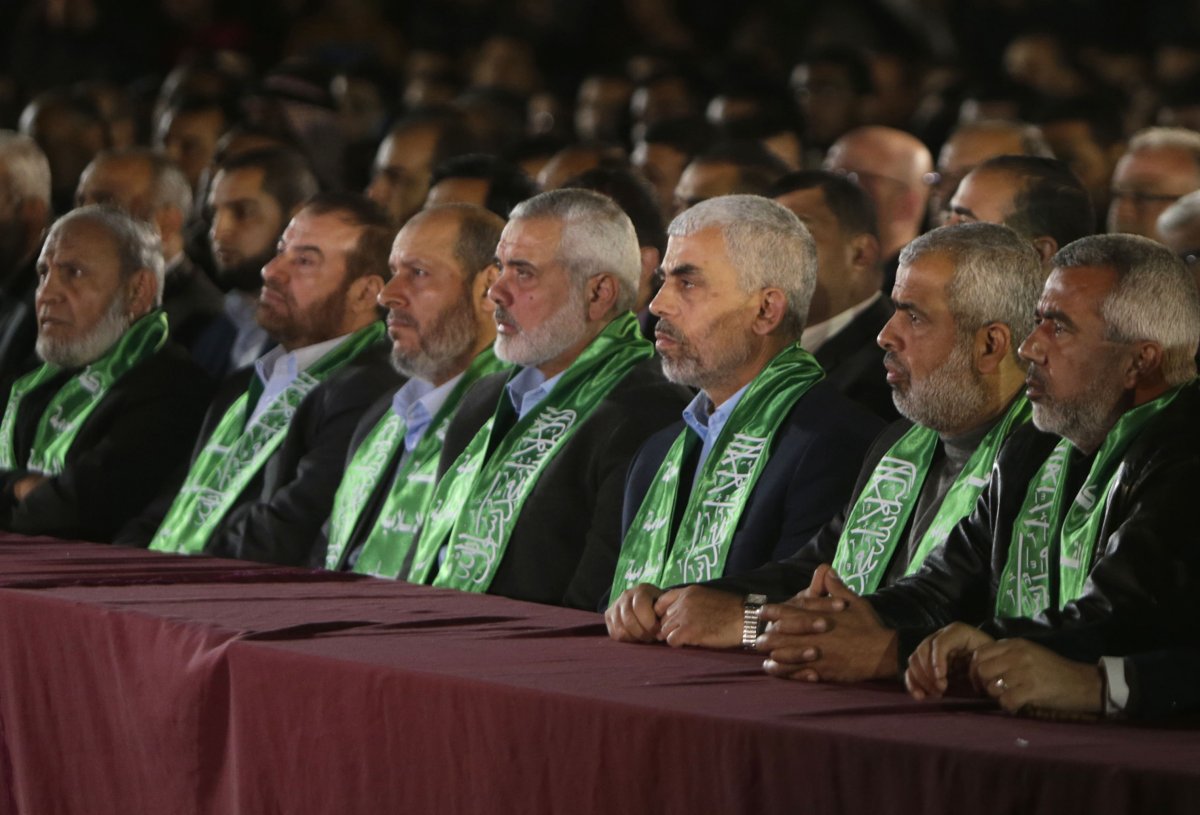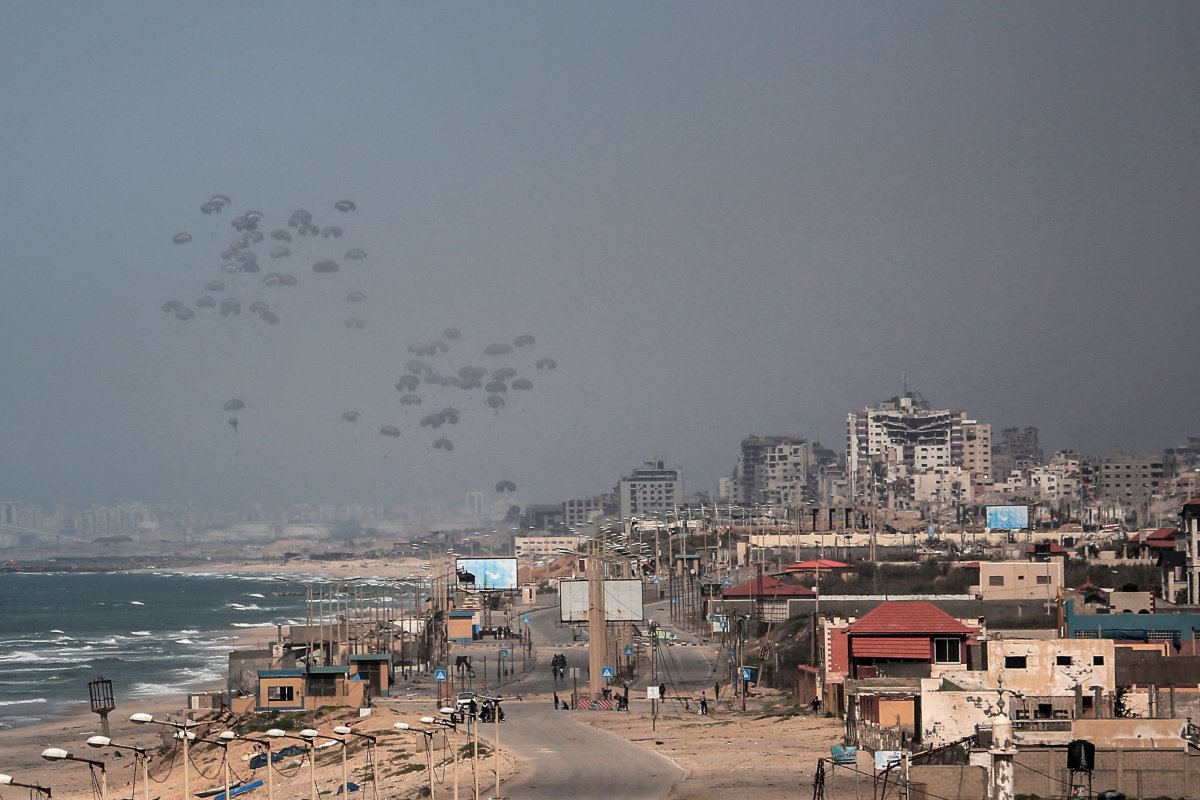David Brennan
Militant group Hamas appears to have questionable support within the devastated Gaza Strip among the 2.3 million Palestinian civilians withering under Israel's excoriating offensive.
New poll results shared with Newsweek by the Institute for Social and Economic Progress (ISEP) think tank on Wednesday showed that fear, despair and anger are roiling Gazans, who have little hope that their immediate situation will improve.
The survey results included responses from 1,000 Palestinian adults—600 in the West Bank and 400 in Gaza—polled between March 3 and 10 in face-to-face interviews conducted on the street.
The West Bank sample included respondents from 62 random locations, including East Jerusalem. The Gaza survey was conducted at 39 random locations in the southern border town of Rafah, where most residents of the Strip have fled to escape the fighting between the Israel Defense Forces (IDF) and Palestinian militants, chief among them Hamas fighters.

An Israeli tank is seen at a position along Israel's border with the Gaza Strip on March 19, 2024. Israeli Prime Minister Benjamin Netanyahu has said Israel intends to retain full security control of Gaza.
Hamas' two most prominent leaders polled badly in the ISEP survey. Ismail Haniyeh, the group's top political leader who resides in Qatar, has support of around 22 percent among Gazans, 10.5 percent of whom express only "soft support." Around 78 percent of Gazans say they are opposed to Haniyeh.
Yahya Sinwar—the group's leader inside Gaza who has so far evaded Israeli forces—has the support of 23.5 percent, of whom 9.5 percent say their support is "soft." Almost 77 percent say they are in opposition to Sinwar.
The leaders poll better among West Bank respondents, of whom almost 45 percent said they support Haniyeh and more than 65 percent Sinwar. Over 37 percent also believed the "Resistance"—a collective term for groups fighting against Israel—will win the war with Israel.
Hamas: Win or Lose?
ISEP respondents from Gaza largely believe Hamas will not win. Only 3.2 percent of those surveyed in the Strip believe that the "Resistance" will emerge victorious.
Around 18 percent expect Israel to expel Gazans from the Strip, while another 18 percent expect a re-occupation of Gaza by the IDF. Most—around 32 percent—expect the Palestinian Authority (PA), which nominally rules in cooperation with Israel in the occupied West Bank, to retake power in the Mediterranean exclave.
Just 3 percent said they would choose continued Hamas rule after the fighting stops, with 34 percent preferring a unity government of all Palestinian factions—including Hamas—and around 45 percent expressing support for PA control. Around 18 percent wanted a coalition of Arab and international forces to take responsibility for the territory.
The picture is less damning for Hamas in another poll released this week, surveying 1,580 adults—830 in the West Bank and 750 in the Gaza Strip—and conducted by the Palestinian Center for Policy and Survey Research (PCPSR) between March 5 and 10.
The PCPSR results found that most Gazans (71 percent) believed Hamas was correct to launch its October 7 attack. Fifty-six percent said they believed Hamas would emerge victorious from the war, while 52 percent said they would choose continued Hamas control of the Strip.
Sixty-two percent told PCPSR they were satisfied with Hamas' performance in the current conflict, and 52 percent said they were satisfied with Sinwar.
Still, PCPSR noted that support for Hamas has declined in both the West Bank and the Gaza Strip versus previous polls, even if respondents support some of the group's actions.
PCPSR's results showed that support for Hamas as a political party rose among Gazans from 22 percent in September to 42 percent in December, before slipping back to 34 percent in March.
"It is clear from the findings, however, that support for the offensive does not mean support for Hamas," the report read. "Instead, the findings show that three quarters of the Palestinians believe that the offensive has put the Palestinian-Israeli issue at the center of attention after years of neglect at the regional and international levels."

Hamas' Gaza leader Yahya Sinwar, third right, sits alongside Hamas political leader Ismail Haniyeh, fourth right, during a memorial event in Gaza City on March 27, 2017. The two leaders retain significant support in both.
Gazans told ISEP that non-Hamas leaders are more appealing. Marwan Barghouti—a member of the Fatah party which dominates the PA and who is now serving five life sentences in Israel having been convicted of offenses including murder—is by far the most popular.
Eighty-four percent of Gazans polled expressed support for Barghouti's leadership, as did around 73 percent of those in the West Bank.
Barghouti is considered a leader of the First and Second Intifadas; two violent Palestinian uprisings against Israeli occupation in the 1980s and 2000s. Despite his bloody past, he has been touted as a possible successor to PA President Mahmoud Abbas, 88, who is widely unpopular after decades in power.
Gaza's Future
Israel launched its latest war on Gaza after Hamas' October 7 surprise infiltration attack, in which some 1,200 people were killed and 253 taken back into the Strip as hostages. Around 100 remain unaccounted for, along with the bodies of 32 captives believed to have already died.
The subsequent assault on Gaza has killed at least 31,819 Palestinians, per data from the Strip's health ministry cited by the Associated Press. Another 435 Palestinians have been killed by Israeli security forces and settlers in the West Bank since October 7, per Associated Press figures.
Swaths of Gaza have been razed, and the vast majority of its 2.3 million residents forced to flee their homes. Scant humanitarian aid has been delivered into the Strip despite growing international pressure on Israel to facilitate more, with the United Nations and NGOs warning that famine is imminent.
Prime Minister Benjamin Netanyahu has said Israel intends to retain full security control of Gaza in the war's aftermath, though his expressed goal of "eradicating" Hamas appears ambitious given the group's decentralized nature and support base—in both Gaza and the West Bank. Under the plan, Israeli forces would also have control of the Gaza-Egypt border area known as the Philadelphi Corridor.
Far-right allies of the prime minister, meanwhile, have advocated for the reestablishment of Israeli settlements in Gaza, reviving some of those dismantled when Israel ended its occupation of the Strip in 2005. Any future Gaza settlements, plus those in the West Bank—which are still being expanded despite international outcry—are considered illegal under international law.

Humanitarian aid parcels attached to parachutes are airdropped from a military aircraft over the central Gaza Strip on March 21, 2024. Israel's offensive has precipitated a humanitarian crisis in the territory.
President Joe Biden's administration and many of its allies have repeatedly warned that Netanyahu and his emergency war time Cabinet are endangering any future hopes of a political settlement between Israelis and Palestinians, such as the effectively defunct two-state solution.
Netanyahu said in January that Israel's needs run "contrary to a Palestinian state." Recent polling indicates collapsed support for a two-state solution among Israelis, more so among Jewish citizens than among their Arab compatriots.
The ISEP poll found that the majority in both the West Bank (62.8 percent) and Gaza (87.8 percent) would accept a two-state solution. A minority of 25.9 percent in the West Bank and a majority of 57.4 percent in Gaza would accept a demilitarized Palestinian state.
A majority in Gaza (61.4 percent) said they would even accept a one-state solution, incorporating Israel, the West Bank and the Gaza Strip if Palestinians were afforded equal rights. A large minority (45 percent) of West Bank respondents said the same in the ISEP poll.
PCPRS found that 62 percent of Gazans surveyed currently support a two-state solution, up from 53 percent in December.
No comments:
Post a Comment